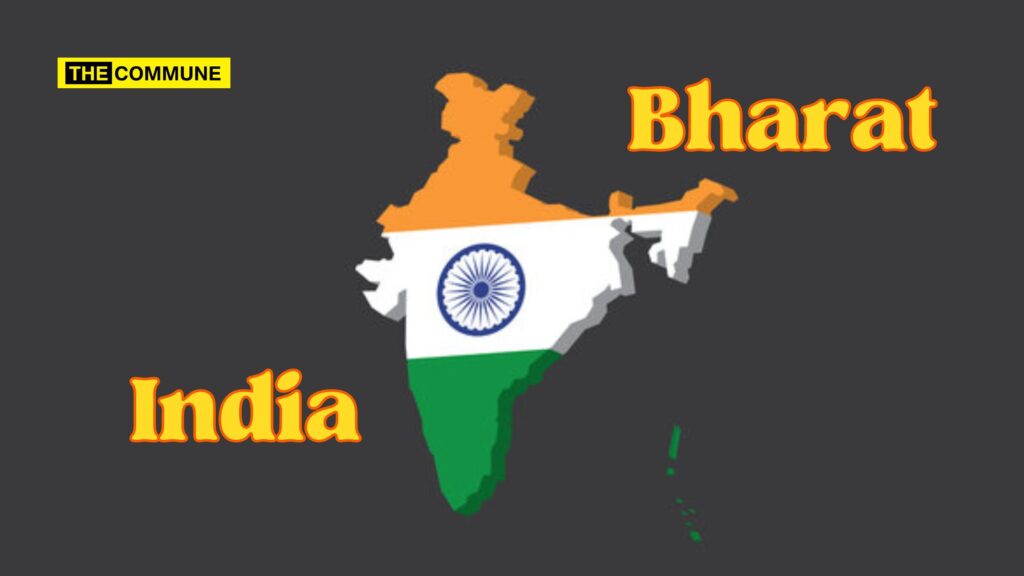There is a big debate that has turned to a political furore over the name of our country. India or Bharat? It has led someone like me to delve into the profound question of how we perceive ourselves as a nation, the evolution of our historical identity, and the role of language and tradition in shaping our collective consciousness
Now, in my opinion, the issue does not deserve the ridiculous amount of anger it has brought to certain people. Knowing our history, knowing that Bharat is what our country was originally called, I thought going back to our origins, our roots, is the right thing to do. Apparently – and to my complete surprise – many people seem to have a problem with this.
The name of a country is more than just a linguistic label; it embodies the core of its character, culture, and history.
The name “Bharat” is derived from the tribe Bharatas. The Rigveda mentions a battle called The Battle of the Ten Kings in which the king of the Bharata tribe warred with nine other tribes. The king of the Bharata tribe won and it is mentioned that the rest of the tribes migrated to Iran after their loss on the battlefield. Bharat is the name that the people of our country gave to themselves.
उत्तरं यत् समुद्रस्य हिमाद्रेश्चैव दक्षिणम्
वर्षं तद् भारतं नाम भारती यत्र सन्ततिः
– Vishnu Purana
This translates to “The country that lies north of the ocean and south of the Himalayas is called Bhārat and the people living there are called Bharati”. This is further evidence of the fact that we have always been Bharat.
The term “Hindus”, which they were later called, was given to them by the Arabs and Iranians when they wanted to refer to the people who lived on the other side of River Sindhu. Our country was then referred to as “Hindustan” (by the Persians) derived from “Hind”. The Greeks, who called River Sindhu “Indus”, later named it India.
Renaming the country need not be as big of a deal as everyone makes it out to be. There are several countries with dual names. Japan is internally referred to as Nippon, Greece as Hellenic Republic, China as Zonghua and so on. Nobody is crying into their pillow because these countries chose their name, so why make a big deal if India is called Bharat?
Moreover, the Constitution starts with “India, that is Bharat” and not “India, that was Bharat”. As insignificant as it may seem, the use of tense is extremely important here. It stresses that India is Bharat and shows that it will continue to be Bharat.
This topic of debate was thrown into the spotlight when invites for the G20 Summit were sent out in the name of “President of Bharat” instead of “President of India”. It was an absolute power move in my opinion, as controversial as it might be for me to say it. It was not just a showpiece. It was a subtle but strong way of letting people know that we were taking back control of our country in every way, including its original name.
Referring to India as Bharat is an acknowledgement of the country’s rich cultural legacy, diversity, historical significance, and spiritual structure. It highlights the continuation of a legacy that has influenced India’s identity for centuries. India underlines its dedication to protecting and honoring its rich culture by embracing the name Bharat. It is evidence of the strong and ageless nature of a country that thrives today while maintaining its rich history as the only surviving Bronze Age civilization.
India emphasizes the need to preserve its cultural history by using the term “Bharat”. It inspires the next generation to discover and value the traditions and historical knowledge that have shaped the country. It fosters pride in the citizens of our country. Well, most citizens, at least.
India is a tapestry woven by different cultures, religions, languages and traditions. “Bharat” is simply the term that encloses the warps and the wefts of the tapestry.
The plan to rename the country is not some elaborate scheme to defame past leaders for their decisions. It is simply to get rid of the bruises that are the colonial marks that mar the body of our beautiful country.
Avani Krishnan is a student in the 11th grade, studying history, economics, political science and maths. She enjoys writing and volunteering at NGOs and animal shelters.
Click here to subscribe to The Commune on Telegram and get the best stories of the day delivered to you personally.

